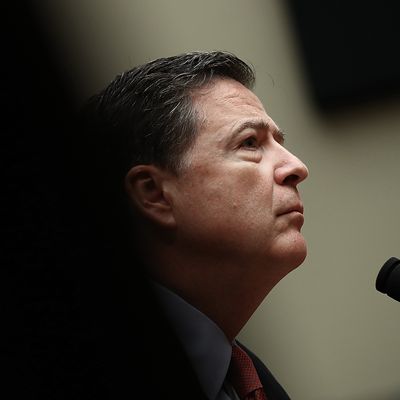
Donald Trump and his party (the two are now essentially indistinguishable) have launched a slick public relations campaign to discredit former FBI Director James Comey. The effort even has a Trump-style bullying nickname, “Lyin’ Comey,” which – by regurgitating the label Trump used during the campaign for Ted Cruz — serves to demonstrate a lack of originality in one of the president’s very few fields of genuine talent.
The most ironic thing about the anti-Comey campaign is its heavy reliance on criticism by Democrats. Trump’s original rationale for firing Comey was that he had mistreated Hillary Clinton during the campaign. Trump couldn’t sustain this absurd cover story very long, blowing it up almost immediately in an interview with Lester Holt in which he confessed to firing Comey to stop the Russia investigation. But now the claim is back, playing a central role. The anti-Comey site cycles through critical quotes from Democrats angry that Comey announced a new investigation into Hillary Clinton in the campaign’s waning days. “I do not have confidence in [Comey] any longer” (Charles Schumer); “badly overstepped his bounds” (Hillary Clinton), and so on.
In his new book, Comey all but confirms the Democrats’ complaints. Comey announced he had closed the investigation into Clinton’s private email server, then announced 10 days before the election he was opening it back up again. Why? Because, as many people suspected, he considered Clinton a lead-pipe cinch to win. “It is entirely possible that, because I was making decisions in an environment where Hillary Clinton was sure to be the next president, my concern about making her an illegitimate president by concealing the restarted investigation bore greater weight than it would have if the election appeared closer or if Donald Trump were ahead in all polls,” he confesses. Contemporaneous text messages between agents assigned to the Clinton case confirm that the agency was acting as though Clinton was certain to win.
Without Comey’s intervention, Clinton very likely would have won, as Nate Silver later showed. But the race was close enough that the shock of Comey’s announcement put her small lead in serious danger.
But Comey’s decision can at least be understood, if not defended, by the context in which he operated. The belief that Clinton would certainly win was not reflected in hard-headed data journalism by sources like FiveThirtyEight or the Upshot — which repeatedly emphasized that Trump’s chances were very real — but it was the assumption of reporters framing the campaign.
More importantly, Comey had serious reason to believe that, if he did not pursue the new lead against Clinton, it would haunt both him and her. The Republican Party has spent decades building up a partisan news environment capable of turning nonevents into imagined first-tier scandals. Conservatives spent years whipping up outrage at the “IRS scandal,” which was nothing more than the agency’s attempt to enforce murky campaign finance law against both liberal and conservative activists alike, as a sinister Obama plot to crush his enemies. They did the same with Benghazi, a case of a bureaucracy caught flat-footed by a terrorist attack, which Republicans depicted as a sinister plot to mislead the public, or even worse.
The Clinton email scandal was not a nonstory. It was a very small scandal of a cabinet official, concerned about privacy, disregarding official instructions on email protocol. Had one of Trump’s cabinet members done the same, it would not rise to one of the ten worst scandals of the week in Trump’s slowest news week. But it was not a pure figment of the right-wing imagination.
Earlier in the summer, Comey had publicly announced he would not press charges, a decision any fair-minded FBI Director would have made. But he went out of his way to scold her, so as to avoid charges of favoritism. Even so, Republicans denounced both Clinton and Comey in hysterical terms. When the bureau discovered new emails, he announced the investigation would be reopened.
It was the Republican party’s derangement, and its willingness to delegitimize the democratic system and federal law enforcement, that loomed over Comey when he made this decision. That fanaticism gave Republicans real leverage over the FBI. In Comey’s mind, bending procedure and announcing he was investigating a candidate was an acceptable price to pay to avoid the opposite: years of hearings and delegitimization that would surely follow Clinton’s expected election.
The fact that he accommodated the GOP’s refusal to accept the rules of the game is what put Comey in his present situation. It probably elected Trump, and it has given Trump the pretext he is now using to discredit Comey. How can you trust a man, he now asks, who bent to the demands of my party? The Republican will to power that Comey thought he could placate is now being brought to bear upon him in a far more brutal and dangerous way. Comey thought in October 2016 he was averting a crisis to the system. He was merely sowing the wind.






























